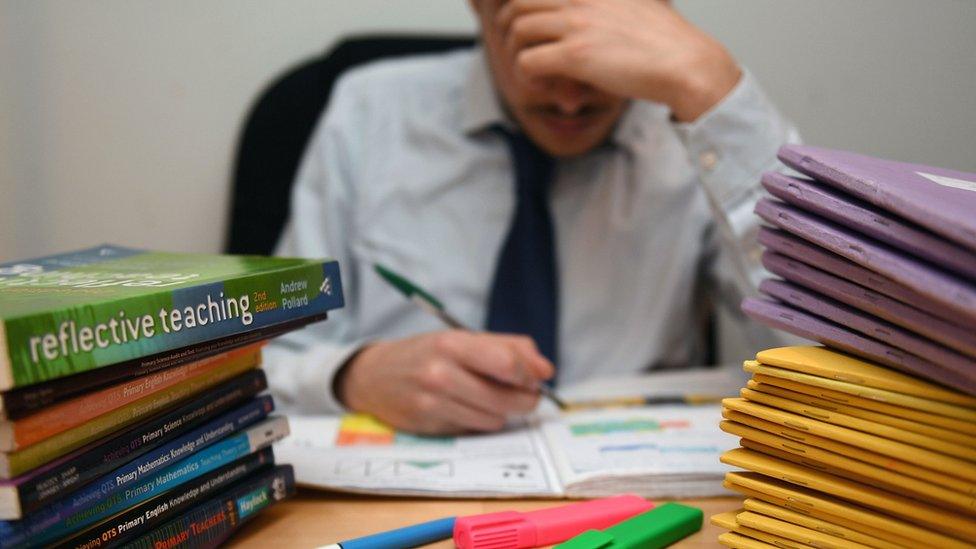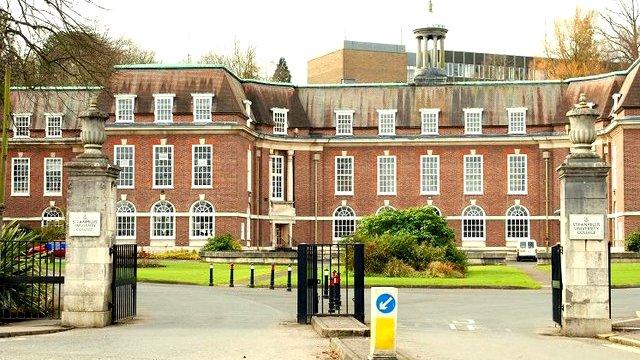Northern Ireland training too many teachers
- Published
- comments

It is estimated that 140 teachers too many will be trained in NI each year for the next 10 years
Northern Ireland is training too many teachers for the jobs market, an official report suggests.
There is forecast to be an oversupply of both teachers and academics seeking work in education over the next decade.
That is according to the latest skills barometer for 2019 published by the Department for the Economy (DfE).
It identifies and assesses both the current and future skills needs of the local economy.
The skills barometer is produced by DfE, but written by academics from Ulster University's Economic Policy Centre (UUEPC).
It has been updated every two years since the first such barometer appeared in 2015, and includes an estimate of graduate demand over the coming decade to 2028.
"The subjects forecast to be predominantly under-supplied are engineering and technology, maths and computer sciences and physical and environmental sciences," the barometer report said.
"It is estimated the economy will require an additional 330 engineering and technology graduates and 290 additional maths and computer science graduates each year."

In contrast, the report said, low growth in public sector spending and likely lower levels of recruitment would mean an over-supply of both teachers and academics.
It estimated an over-supply of about 140 teachers trained each year, for the next decade.
In 2018, 515 newly-qualified teachers graduated from Northern Ireland's four teacher training institutions.
The report's authors it was important people made informed decisions about their chosen degree subject.
The barometer also said that professional and technical qualifications were still undervalued compared to university degrees.
"This contributes to students not considering professional and technical paths when making decisions related to their tertiary level education, which leads to mid-level skills shortages," it stated.
The report also said that the number of young people leaving schools with relatively low qualifications was "concerning."
It noted that around three in 10 school leavers failed to gain 5 GCSEs including English and Maths at grades A* - C.
"A high proportion of school leavers with low qualifications put pressure on other parts of the education system," the report said.
This meant the majority of learners qualifying from Further Education Colleges took relatively low-level courses.
It also said that children entitled to free school meals (FSM) were still much more likely to leave school with lower qualifications than less disadvantaged children.
Information Technology is the sector likely to see the biggest jobs growth in the coming decade to 2028.
The barometer estimates that about 10,000 more computer programmers will be needed in Northern Ireland over that period.

A quarter of those employed in NI at the minute have an undergraduate degree
Other areas expected to see significant jobs growth are the hospitality, health and legal sectors.
A third (33%) of vacancies over the next decade are expected to require degree level qualifications at a minimum.
Currently, according to the skills barometer, 23% of people currently employed in Northern Ireland have at least an undergraduate degree.
The barometer also forecasts how many extra jobs will be created in Northern Ireland over the coming decade to 2028.
Under a high growth scenario 85,380 extra jobs will be created in the next 10 years - about 8,500 a year.
However, under a baseline scenario - which the UUEPC considers the most likely economic outcome - only 39,130 extra jobs will be created over the next decade.
"That is approximately half the number of jobs created in the 2012-18 period and therefore represents a much slower annual rate of job creation," the report said.
- Published12 February 2015
